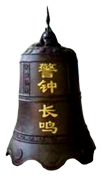
南开校友及各界朋友信息交流网站 |
|
李维树
李维树,天津市人。 1937年12月生。南开大学教授。1957年入读学南开大学外文系(外国语学院前身)英语专业 。曾被抽调出任外文系团总支副书记兼学生政治辅导员。 1963年复课加入我们班(1960级英语专业),是我们班最棒的歌唱家之一。李维树严格要求自己,热心帮助同学,使我们班始终团结一致,大家都积极向上,成为当时校先进集体之一。维树毕业后先后在外文系和旅游学系任教,并先后任外文系副主任和旅游学系主任。曽担任天津旅游学会副会长,中国旅游协会理事,世界闲暇和娱乐协会理事等职务。 1973年,1983年,和1986-1987年曾先后三次作为访问学者被派往英国科切尔斯特英语学习中心和美国10 余所大学进行有关英语教学法,美国学和跨文化沟通专业学习考察和研究。 1993年始享受国务院特殊津贴专家待遇。
 主要著述: 主要著述:
《试论文化差异可以形成一种旅游资源》 ( 为1993年12月赴台湾参加大陆旅行学术研讨会而写,后刊登在台湾明传管理大学校刊和《旅游学刊》( 1994,4)上。
《Domestic Tourism, a Popular Form of Leisure and Recreation, in China》 (为参加1992年6月在西班牙 毕尔巴鄂市召开的世界闲暇和娱乐协会理事会暨学术研讨会而写。)
《Youth Tourism and Recreation in China》 (为出席1994年10月在美国明尼阿波利斯市举行的国家娱乐和公园协会(National Recreation and Park Association)学术研讨会而写,后刊登在《World Leisure $ Recreation》,Volume 35)
《Cultural Elements in Hospitality Service Management》 (1997年3月应香港 理工大学酒店旅游管理系的邀请做学术讲座。)
《高等旅游教育探索之路》, 刊登在《旅游科学》1993年第三期
《从香港旅游业的发展看世界旅游发展趋势》本文搜集在国家旅游局人教司主编的《加强旅游业宏观管理》一书。
《世界旅游组织类型及其主要职能》该文发表在《世界经济年鉴》1993年版第8卷31页
 李维树在台湾举行的旅游会议上发言, 1993
李维树在台湾举行的旅游会议上发言, 1993 |
 李维树 1965
李维树 1965 |
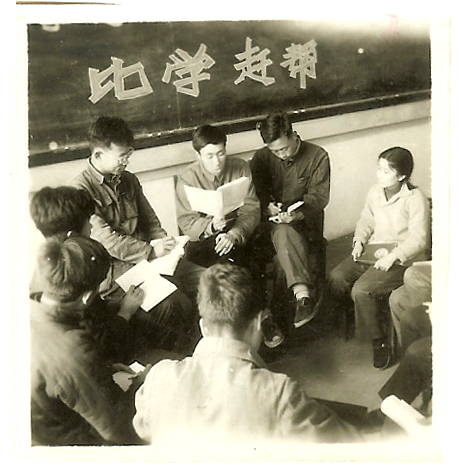
学雷锋活动:正面左起李明德、李维树、赵兴、朱柏桐, 背侧面右起高东山、佟学龄、杨俊起,early 60s.
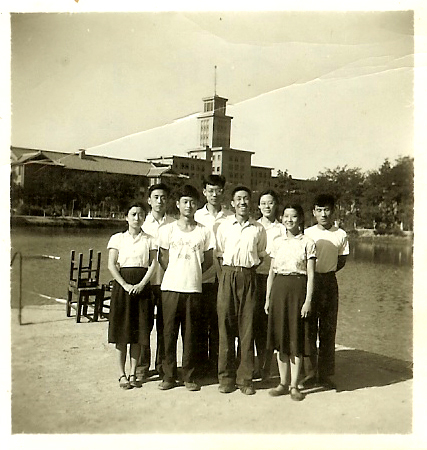
毕业照前排右起第二人为李维树 1965
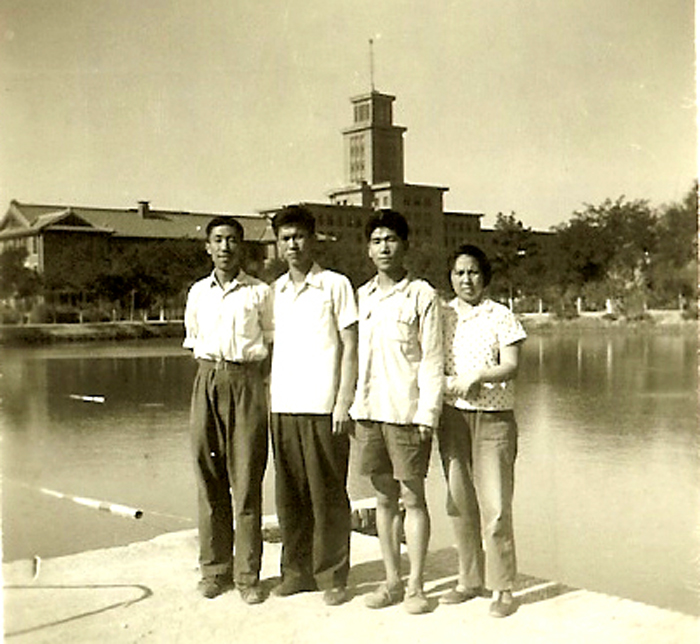
毕业合影左起李维树、常耀信、高东山、鲁琪,新开湖畔 1965

毕业合影前起李维树、吴清心、叶东炜、吕玉池、高东山、李清和、常耀信、赵宏博、鲁琪, July 1965
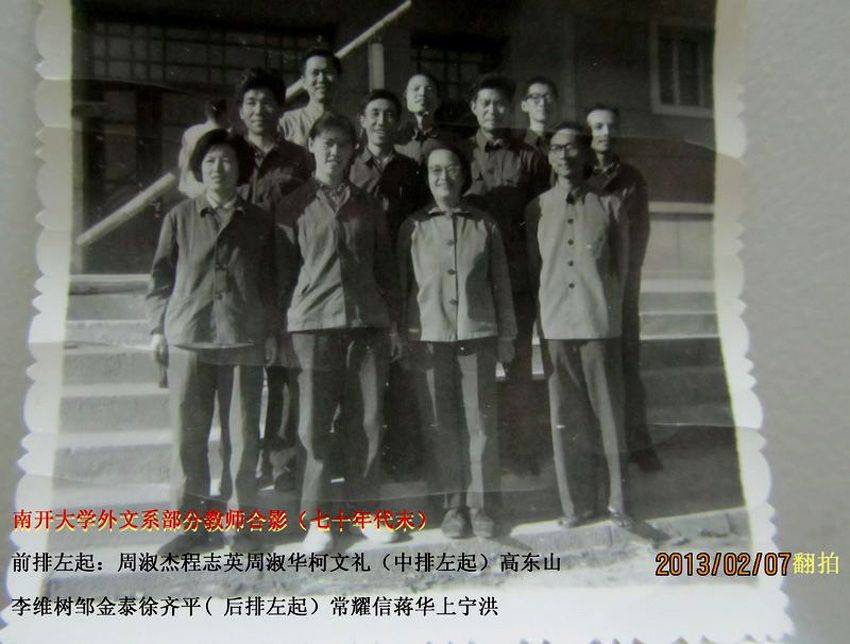
|
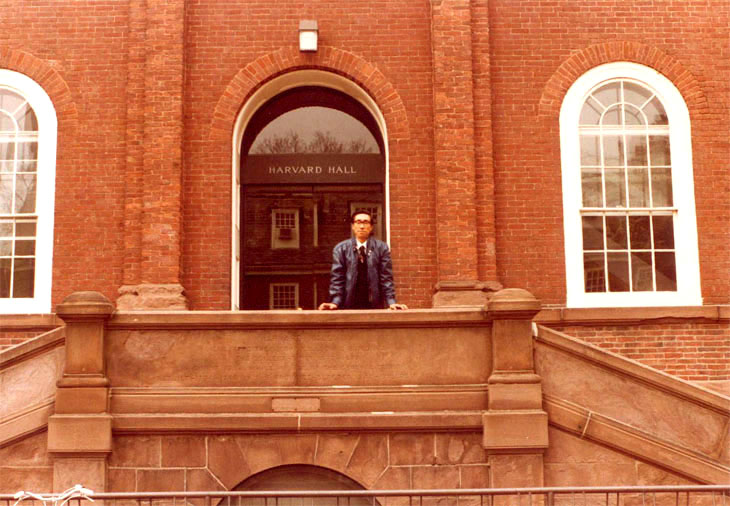 李维树访问美国哈佛大学
李维树访问美国哈佛大学, 1994 |
 李维树在西班牙参加国际旅游会议,1992
李维树在西班牙参加国际旅游会议,1992 |
 李维树在美国Minneapolis参加国际旅游会议, 1994
李维树在美国Minneapolis参加国际旅游会议, 1994 |

前排左起谷启楠、苏智娟、马振铃、王蕴茹、蔡丽文、杨小爱;后排左起第五常耀信、刘士聪、邹金泰、唐先生、李维树,2007年6月

前排左起蔡文美、朱柏桐、谷启楠、王蕴茹、李维树;后排左起刘士聪、崔永禄、孙毅兵, 1996年1月

吕玉池(中)高书宪(左一,1962届,少将)李维树,1995, 摄于 乌鲁木齐

南开校友金敏宜、赵宏博、吕玉池、李清和、李维树(站立者),2004年

左起朱柏桐、苏智娟、谷启楠、李维树

90年代贺新到天津与老同学团聚:左起李维树、贺新、马老师、崔永禄、刘士聪

90年代贺新到天津与老同学团聚:左起李维树、贺新、崔永禄、孙学诗、刘士聪
维树书法作品集
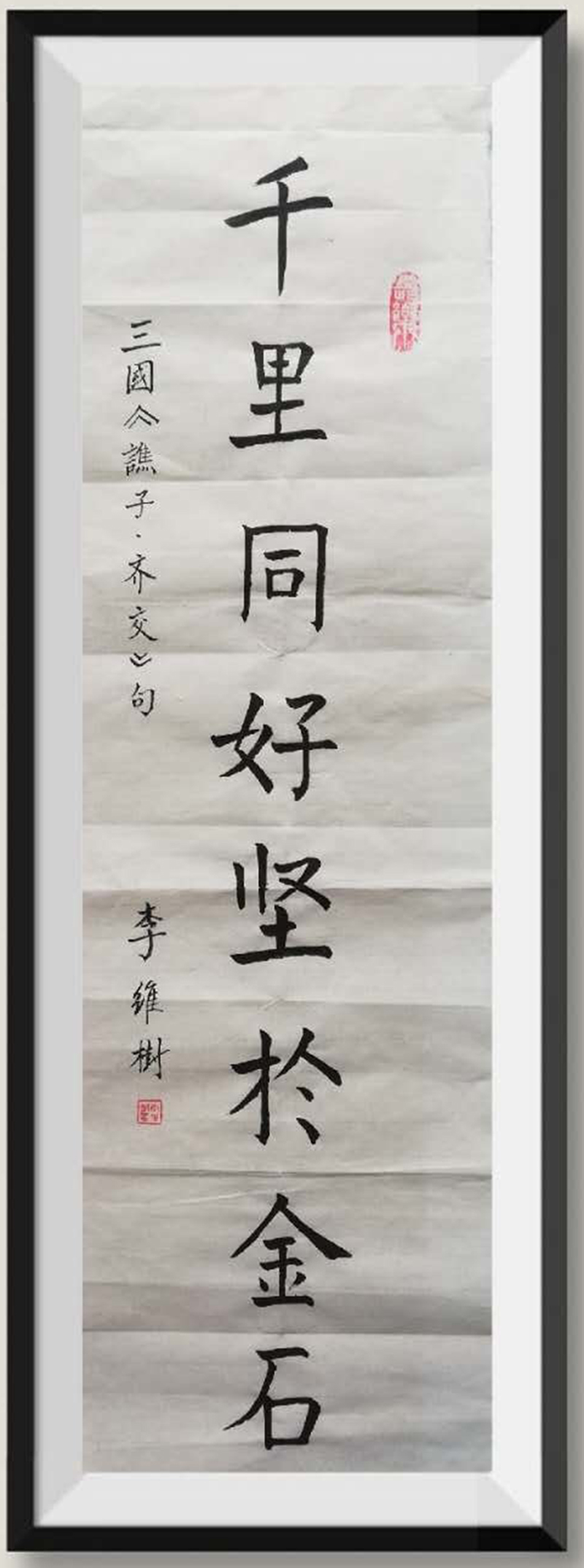
|
|
English Poet, John Keats (1795-1821) |
| 
John Keats, by William Hilton (died 1839)
(This work of art is in public domain.)
John Keats (1795 – 1821) was an English poet who became one of the key poets of the English Romantic movement during the early nineteenth century. John Keats was born on October 31, 1795 in London. His parents were Frances Jennings and Thomas Keats. John Keats was educated at Enfield School, which was known for its liberal education. While at Enfield, Keats was encouraged by Charles Cowden Clarke in his reading and writing. After the death of his parents when he was fourteen, Keats became apprenticed to a surgeon. In 1815 he became a student at Guy's Hospital. However, after qualifying to become an apothecary-surgeon, Keats gave up the practice of Medicine to become a poet. Keats had begun writing as early as 1814 and his first volume of poetry was published in 1817.
During his very short life, his work received constant critical attacks from periodicals of the day, but his posthumous influence on poets such as Alfred Tennyson and Wilfred Owen has been immense. Elaborate word choice and sensual imagery characterize Keats' poetry, including a series of odes that were his masterpieces and which remain among the most popular poems in English literature. Keats's letters, which expound on his aesthetic theory of "negative capability",are among the most celebrated by any writer.
 
A Thing of Beauty (Endymion)
by John Keats |
|
|
A thing of beauty is a joy for ever:
Its lovliness increases; it will never
Pass into nothingness; but still will keep
A bower quiet for us, and a sleep
Full of sweet dreams, and health, and quiet breathing.
Therefore, on every morrow, are we wreathing
A flowery band to bind us to the earth,
Spite of despondence, of the inhuman dearth
Of noble natures, of the gloomy days,
Of all the unhealthy and o'er-darkn'd ways
Made for our searching: yes, in spite of all,
Some shape of beauty moves away the pall
From our dark spirits. Such the sun, the moon,
Trees old and young, sprouting a shady boon
For simple sheep; and such are daffodils
With the green world they live in; and clear rills
That for themselves a cooling covert make
'Gainst the hot season; the mid-forest brake,
Rich with a sprinkling of fair musk-rose blooms:
And such too is the grandeur of the dooms
We have imagined for the mighty dead;
An endless fountain of immortal drink,
Pouring unto us from the heaven's brink.
|
|
|
When I Have Fears that I May Cease to Be
by John Keats
|
|
|
WHEN I have fears that I may cease to be
Before my pen has glean'd my teeming brain,
Before high piled books, in charact'ry,
Hold like rich garners the full-ripen'd grain;
When I behold, upon the night's starr'd face,
Huge cloudy symbols of a high romance,
And feel that I may never live to trace
Their shadows, with the magic hand of chance;
And when I feel, fair creature of an hour!
That I shall never look upon thee more,
Never have relish in the faery power
Of unreflecting love;--then on the shore
Of the wide world I stand alone, and think,
Till Love and Fame to nothingness do sink.
|
|
|
Ode On A Grecian Urn
by John Keats
|
|
|
Thou still unravish'd bride of quietness,
Thou foster-child of silence and slow time,
Sylvan historian, who canst thus express
A flowery tale more sweetly than our rhyme:
What leaf-fring'd legend haunts about thy shape
Of deities or mortals, or of both,
In Tempe or the dales of Arcady?
What men or gods are these? What maidens loth?
What mad pursuit? What struggle to escape?
What pipes and timbrels? What wild ecstasy?
Heard melodies are sweet, but those unheard
Are sweeter; therefore, ye soft pipes, play on;
Not to the sensual ear, but, more endear'd,
Pipe to the spirit ditties of no tone:
Fair youth, beneath the trees, thou canst not leave
Thy song, nor ever can those trees be bare;
Bold Lover, never, never canst thou kiss,
Though winning near the goal yet, do not grieve;
She cannot fade, though thou hast not thy bliss,
For ever wilt thou love, and she be fair!
Ah, happy, happy boughs! that cannot shed
Your leaves, nor ever bid the Spring adieu;
And, happy melodist, unwearied,
For ever piping songs for ever new;
More happy love! more happy, happy love!
For ever warm and still to be enjoy'd,
For ever panting, and for ever young;
All breathing human passion far above,
That leaves a heart high-sorrowful and cloy'd,
A burning forehead, and a parching tongue.
Who are these coming to the sacrifice?
To what green altar, O mysterious priest,
Lead'st thou that heifer lowing at the skies,
And all her silken flanks with garlands drest?
What little town by river or sea shore,
Or mountain-built with peaceful citadel,
Is emptied of this folk, this pious morn?
And, little town, thy streets for evermore
Will silent be; and not a soul to tell
Why thou art desolate, can e'er return.
O Attic shape! Fair attitude! with brede
Of marble men and maidens overwrought,
With forest branches and the trodden weed;
Thou, silent form, dost tease us out of thought
As doth eternity: Cold Pastoral!
When old age shall this generation waste,
Thou shalt remain, in midst of other woe
Than ours, a friend to man, to whom thou say'st,
"Beauty is truth, truth beauty,--that is all
Ye know on earth, and all ye need to know."
|
|
|
Ode on Melancholy
by John Keats
|
|
|
No, no! go not to Lethe, neither twist
Wolf's-bane, tight-rooted, for its poisonous wine;
Nor suffer thy pale forehead to be kissed
By nightshade, ruby grape of Proserpine;
Make not your rosary of yew-berries,
Nor let the beetle nor the death-moth be
Your mournful Psyche, nor the downy owl
A partner in your sorrow's mysteries;
For shade to shade will come too drowsily,
And drown the wakeful anguish of the soul.
But when the melancholy fit shall fall
Sudden from heaven like a weeping cloud,
That fosters the droop-headed flowers all,
And hides the green hill in an April shroud;
Then glut thy sorrow on a morning rose,
Or on the rainbow of the salt sand-wave,
Or on the wealth of globed peonies;
Or if thy mistress some rich anger shows,
Emprison her soft hand, and let her rave,
And feed deep, deep upon her peerless eyes.
She dwells with Beauty -- Beauty that must die;
And Joy, whose hand is ever at his lips
Bidding adieu; and aching Pleasure nigh,
Turning to poison while the bee-mouth sips;
Ay, in the very temple of delight
Veiled Melancholy has her sovran shrine,
Though seen of none save him whose strenuous
tongue
Can burst Joy's grape against his palate fine;
His soul shall taste the sadness of her might,
And be among her cloudy trophies hung. |
|
|
Happy Is England
by John Keats
|
|
|
Happy is England! I could be content
To see no other verdure than its own;
To feel no other breezes than are blown
Through its tall woods with high romances blent:
Yet do I sometimes feel a languishment
For skies Italian, and an inward groan
To sit upon an Alp as on a throne,
And half forget what world or worldling meant.
Happy is England, sweet her artless daughters;
Enough their simple loveliness for me,
Enough their whitest arms in silence clinging:
Yet do I often warmly burn to see
Beauties of deeper glance, and hear their singing,
And float with them about the summer waters.
|
|
|
Hither, Hither, Love
by John Keats
|
|
|
HITHER hither, love---
'Tis a shady mead---
Hither, hither, love!
Let us feed and feed!
Hither, hither, sweet---
'Tis a cowslip bed---
Hither, hither, sweet!
'Tis with dew bespread!
Hither, hither, dear
By the breath of life,
Hither, hither, dear!---
Be the summer's wife!
Though one moment's pleasure
In one moment flies---
Though the passion's treasure
In one moment dies;---
Yet it has not passed---
Think how near, how near!---
And while it doth last,
Think how dear, how dear!
Hither, hither, hither
Love its boon has sent---
If I die and wither
I shall die content!
|
|
|
Ode To Autumn
by John Keats
|
|
|
Season of mists and mellow fruitfulness,
Close bosom-friend of the maturing sun;
Conspiring with him how to load and bless
With fruit the vines that round the thatch-eaves run;
To bend with apples the mossed cottage-trees,
And fill all fruit with ripeness to the core;
To swell the gourd, and plump the hazel shells
With a sweet kernel; to set budding more,
And still more, later flowers for the bees,
Until they think warm days will never cease,
For Summer has o'er-brimmed their clammy cell.
Who hath not seen thee oft amid thy store?
Sometimes whoever seeks abroad may find
Thee sitting careless on a granary floor,
Thy hair soft-lifted by the winnowing wind;
Or on a half-reaped furrow sound asleep,
Drowsed with the fume of poppies, while thy hook
Spares the next swath and all its twined flowers;
And sometimes like a gleaner thou dost keep
Steady thy laden head across a brook;
Or by a cider-press, with patient look,
Thou watchest the last oozings, hours by hours.
Where are the songs of Spring? Ay, where are they?
Think not of them, thou hast thy music too,---
While barred clouds bloom the soft-dying day,
And touch the stubble-plains with rosy hue;
Then in a wailful choir, the small gnats mourn
Among the river sallows, borne aloft
Or sinking as the light wind lives or dies;
And full-grown lambs loud bleat from hilly bourn;
Hedge-crickets sing; and now with treble soft
The redbreast whistles from a garden-croft,
And gathering swallows twitter in the skies.
|
|
|
Ode To A Nightingale
by John Keats
|
|
|
My heart aches, and a drowsy numbness pains
My sense, as though of hemlock I had drunk,
Or emptied some dull opiate to the drains
One minute past, and Lethe-wards had sunk:
'Tis not through envy of thy happy lot,
But being too happy in thy happiness,---
That thou, light-winged Dryad of the trees,
In some melodious plot
Of beechen green, and shadows numberless,
Singest of summer in full-throated ease.
O for a draught of vintage, that hath been
Cooled a long age in the deep-delved earth,
Tasting of Flora and the country green,
Dance, and Provencal song, and sun-burnt mirth!
O for a beaker full of the warm South,
Full of the true, the blushful Hippocrene,
With beaded bubbles winking at the brim,
And purple-stained mouth;
That I might drink, and leave the world unseen,
And with thee fade away into the forest dim:
Fade far away, dissolve, and quite forget
What thou among the leaves hast never known,
The weariness, the fever, and the fret
Here, where men sit and hear each other groan;
Where palsy shakes a few, sad, last gray hairs,
Where youth grows pale, and spectre-thin, and dies;
Where but to think is to be full of sorrow
And leaden-eyed despairs;
Where beauty cannot keep her lustrous eyes,
Or new love pine at them beyond tomorrow.
Away! away! for I will fly to thee,
Not charioted by Bacchus and his pards,
But on the viewless wings of Poesy,
Though the dull brain perplexes and retards:
Already with thee! tender is the night,
And haply the Queen-Moon is on her throne,
Clustered around by all her starry fays;
But here there is no light,
Save what from heaven is with the breezes blown
Through verdurous glooms and winding mossy ways.
I cannot see what flowers are at my feet,
Nor what soft incense hangs upon the boughs,
But, in embalmed darkness, guess each sweet
Wherewith the seasonable month endows
The grass, the thicket, and the fruit-tree wild;
White hawthorn, and the pastoral eglantine;
Fast-fading violets covered up in leaves;
And mid-May's eldest child,
The coming musk-rose, full of dewy wine,
The murmurous haunt of flies on summer eves.
Darkling I listen; and for many a time
I have been half in love with easeful Death,
Called him soft names in many a mused rhyme,
To take into the air my quiet breath;
Now more than ever seems it rich to die,
To cease upon the midnight with no pain,
While thou art pouring forth thy soul abroad
In such an ecstasy!
Still wouldst thou sing, and I have ears in vain---
To thy high requiem become a sod
Thou wast not born for death, immortal Bird!
No hungry generations tread thee down;
The voice I hear this passing night was heard
In ancient days by emperor and clown:
Perhaps the self-same song that found a path
Through the sad heart of Ruth, when, sick for home,
She stood in tears amid the alien corn;
The same that oft-times hath
Charmed magic casements, opening on the foam
Of perilous seas, in faery lands forlorn.
Forlorn! the very word is like a bell
To toll me back from thee to my sole self!
Adieu! the fancy cannot cheat so well
As she is famed to do, deceiving elf.
Adieu! adieu! thy plaintive anthem fades
Past the near meadows, over the still stream,
Up the hill-side; and now 'tis buried deep
In the next valley-glades:
Was it a vision, or a waking dream?
Fled is that music:---do I wake or sleep?
|
|
|
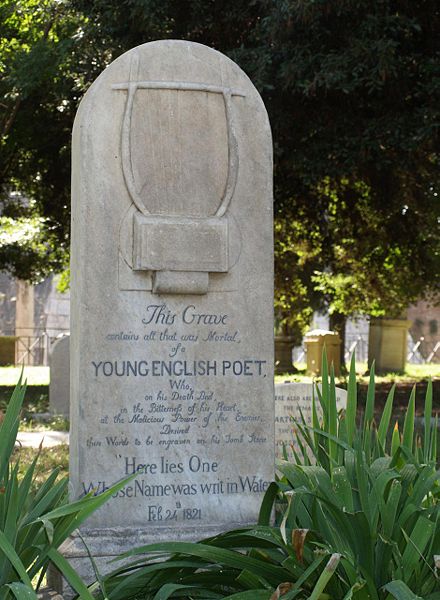
Keats grave in Rome.
(Re-use of this photo under the terms of the GNU Free Documentation License)
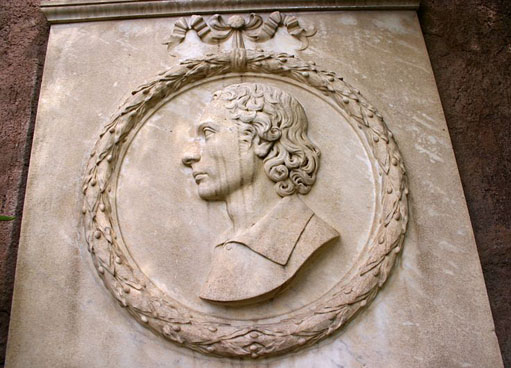
Keats' grave in Protestant cemetery, Rome. A plaque with a medallion portrait of
John Keats next to his grave, on the wall.
(Picture by Giovanni Dall'Orto, March 31st 2008)
 
|
    
|
